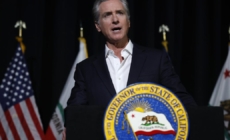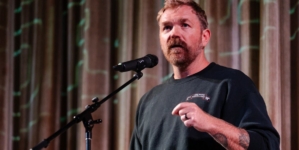-
New England Patriots extend winning streak to FIVE games — Can they keep rolling? - 19 mins ago
-
How to Watch Buccaneers vs Saints: Live Stream NFL Week 8, TV Channel - 39 mins ago
-
Best of CFB Week 9 Press Conferences | FOX College Football - about 1 hour ago
-
Staffing issues trigger temporary ground stop at LAX - about 1 hour ago
-
Jordan Love Gives Honest Thoughts on Aaron Rodgers Before Packers-Steelers - about 1 hour ago
-
Federal food aid will not go out starting Nov. 1 amid government shutdown, Trump administration says - about 1 hour ago
-
Drake Maye Launches 39-Yard TD Pass to Kayshon Boutte, Extending Patriots’ Lead Over Browns | NFL Highlights - 2 hours ago
-
Jon Jones Trolls Tom Aspinall After UFC 321 Controversy - 2 hours ago
-
George Kittle hauls in OUTRAGEOUS TD CATCH as 49ers chip away at Texans’ lead | NFL Highlights - 2 hours ago
-
Newsom, Harris both considering runs for president in 2028 - 3 hours ago
Tanzania Elections: One Woman, One Party Hold All Cards
The green-and-yellow colors of Tanzania’s ruling Chama Cha Mapinduzi (CCM) party dominate every street. From the airport highway to the portside neighborhoods, the face of President Samia Suluhu Hassan (65) beams from banners, billboards, and vendor stalls. A constant reminder of her near-unquestioned hold on power as the country heads into the October 29 elections.
For the first time since she assumed office in 2021 following the sudden death of her predecessor, John Magufuli, President Samia seeks a full elected term of her own. The election, viewed by many as a formality, is expected to reaffirm CCM’s decades-long control of Tanzanian politics.
“Mama Samia” and the CCM Machine
Tanzania has been ruled by CCM since independence in 1961. Though multiparty politics was formally introduced in 1992, the system has remained one of limited competition. The party’s extensive grassroots network, from ward committees to parliamentary branches, from youth and women’s wings to agricultural and labor committees, continues to sustain palpable loyalty and helps it present itself as a solid electoral machine.
This year’s race underscores that dominance. The major opposition party, Chama Cha Demokrasia na Maendeleo (Chadema), was disqualified after refusing to sign the constitution mandated electoral code of conduct. The Alliance for Change and Transparency (ACT-Wazalendo) lost its candidate, Luhaga Mpina, after a petition from the Registrar of Political Parties barred him from running.
Meanwhile, Chadema chair Tundu Lissu faces treason charges for advocating an election boycott and calling for a public revolt. But interestingly, frustrations are evident within his own ranks. “Our party was led by the previous and founding leader Freeman Aikaeli Mbowe with zeal,” said one senior Chadema member, speaking to Newsweek on condition of anonymity for fear of reprisal from own party members. “Under him we would have stood a solid chance of challenging CCM this time. But Lissu ruined it all by his self-centric strategies. The charges against him are surely exaggerated, but he didn’t let us focus on developmental issues, only on noise. Look where that landed us now.” Newsweek approached few other Chadema members; but none agreed to speak on record.
Another opposition leader, Advocate Mohammed Majaliwa, of the Civic United Front (CUF), described to Newsweek the financial and political imbalance smaller parties face.
“The campaign depends on your pocket, your financial muscles,” Majaliwa said. “Ours doesn’t qualify for state funding. It is for those parties that meet the rules. My party CUF doesn’t receive any government grant, so we use our own money. It becomes tough, an economic burden, but we try our best.”
When asked whether he or his party faced any oppression from the government, Majaliwa said that, despite limitations, they did not. “Frankly speaking, I never faced any oppression from the ruling party, though I can witness it with others,” he said. “Politics is our only business. If you’re a political party, you must contest. Boycotts don’t build democracy.”
The supporters of President Samia (also addressed as “Mama Samia”) point to economic progress, social openness, and diplomatic outreach as proof of her steady hand. Within CCM, her leadership they say feel revitalized a party that once leaned heavily on revolutionary nostalgia.
Hamoud Jumaa, a member of the national assembly of Tanzania and a CCM leader, speaking to Newsweek, responded to opposition allegations. “Tanzanian politics often gets misreported. Whatever happens here is no different from the rest of the world. Every political party tries to counter the other. But you can’t stay at home and call yourself oppressed while refusing to contest elections. That’s just drama.”
He added that international news coverage often misses the nuances of Tanzanian politics.
“Many global media outlets say the opposition doesn’t get a level playing field. But you can’t call for anarchy and boycott elections and then claim you’re just doing politics,” he said.
Jasdeep Singh Babhra, a Sikh CCM leader and local government representative paints an interesting picture, as he is the only turbaned Sikh to have been elected to office in Tanzania. “I am a Sikh in a Muslim-Christian majority country, elected by people of all faiths. I am proof that political participation in Tanzania is inclusive. We have about 160 tribes and many religions, yet we all come together as one,” he told Newsweek. “Inflation is under control. The national debt is sustainable. Tourism is soaring. Under President Samia’s leadership, Tanzania has opened diplomatically and economically,” he added.

A Youthful Nation and a Calculated Calm
On the streets of Dar es Salaam, the atmosphere is more pragmatic than political. Most Tanzanians, nearly 60 percent, are under 26, and their priorities are economic rather than ideological.
“We Tanzanians can now breathe again in this administration,” Mnyakyusa Mgabo, 27, a small-business owner in Dodoma, told Newsweek. “Businesses are thriving and we are happier as a nation. Her predecessor Magufuli had made life hell with his socialistic attitude. Things are better now.”
“The youth here only want stability and opportunity,” said John B., 23, a recent graduate now driving for Uber. “Anyone who gets us these, we will support them. The current president is working just fine and aleast she is trying.”
“Tanzania may not be perfect yet, but we are certainly the most stable country in East Africa,” Aaliyah D., 25, Assistant Manager at a local firm, told Newsweek. “It makes many of us proud to see, for the first time in our lives, a woman leading this country.” With opposition parties fragmented and public opinion largely favoring peace and progress, CCM’s victory in 2025 appears real.
The outcome of 2025 election may reinforce United Republic of Tanzania’s image as East Africa’s anchor of stability, even as it raises questions about the depth of its democratic evolution. Whether that balance can translate into inclusive growth for its restless youth will define the next chapter of East Africa’s quiet success story.

Source link































